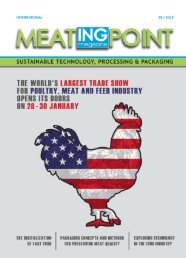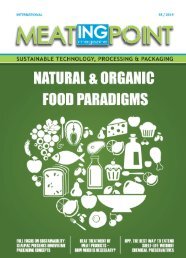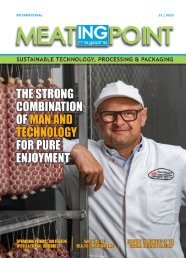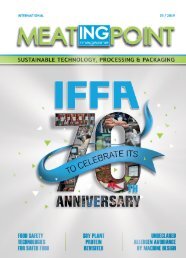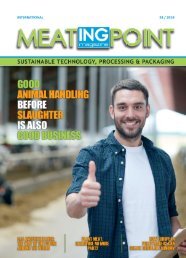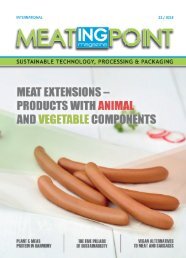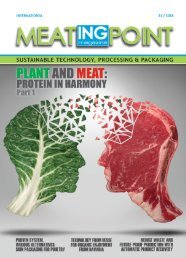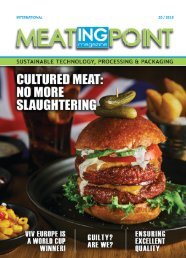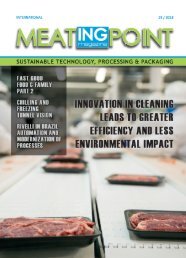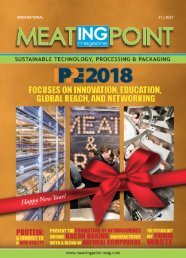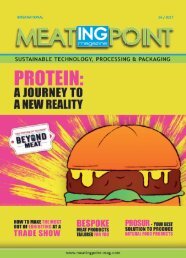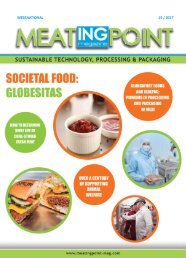MEATing POINT Magazine: #08/ 2016
You also want an ePaper? Increase the reach of your titles
YUMPU automatically turns print PDFs into web optimized ePapers that Google loves.
ENERGY EFFICIENCY<br />
to bring robotics into the production and<br />
kitchen space to enhance the productivity.<br />
It must be essential since with rising<br />
populations, the ability to produce sufficient<br />
safe food is being questioned. UK based<br />
OAL group have recognized this with their<br />
development of the system they are calling<br />
APRIL, the robotic chef. However this is<br />
a technology push and there needs to be<br />
greater recognition of the significance<br />
of the situation and manufacturers and<br />
retailers alike shouting about their need<br />
to improve their productivity, they need to<br />
invest appropriately and incorporate robotics<br />
within their manufacturing environment.<br />
Early signs are that maybe this message is<br />
starting to stick. Some robotic manufacturers<br />
are reporting as much as 35% increase<br />
in enquiries from Food and drink sector<br />
manufacturers – but this is from a low<br />
starting point, and does not necessarily<br />
indicate a wide scale adoption.<br />
The shift to robotics shouldn’t be feared,<br />
and any concerns over job losses are largely<br />
unsubstantiated. Barclay’s bank in 2105<br />
forecast that an investment of £1.2bn in<br />
automation would safeguard 106,000<br />
jobs through addition of £60bn to the<br />
UK economy. The increase in output from<br />
the installation of a new automated line<br />
consisting of 47 robots by Premier Foods<br />
at their Mr Kipling factory resulted in the<br />
creation of 80 new jobs, as a result of their<br />
doubled capacity.<br />
Robots are adaptable and reliable and<br />
increasingly being deployed in all sectors<br />
of the food industry chain from slaughter<br />
houses, baking lines right through to the<br />
more familiar palletising and<br />
warehousing robots. With the<br />
increase in robotic investment<br />
overseas and the threat of cheaper<br />
imports, this is time that all sectors<br />
in the food and drink industry need<br />
to consider improving productivity<br />
by getting themselves ‘robot<br />
ready’ and looking where robot<br />
deployment could enhance their<br />
own productivity and profitability.<br />
References:<br />
Barclays Bank 2015, First accessed<br />
www.newsroom.barclays.co.uk/r/3273/<br />
investment_in_manufacturing_robotics_<br />
could_boost_british<br />
www.auroraceres.co.uk<br />
About the authors:<br />
Naomi Diaz-Osborn<br />
Bsc (Hons), M.Sc, Principal Consultant – Strategy<br />
and Innovation, The Aurora Ceres Partnership Ltd,<br />
Naomi.diaz@auroraceres.co.uk<br />
Naomi is a Mathematics and Operations Research graduate who has<br />
developed Business Analysis, Process Consulting and Innovation Management<br />
skills during twenty years of internal and external consulting roles.<br />
Having worked across a variety of business sectors, including food,<br />
Naomi has worked collaboratively to analyse and inform supply chain<br />
and company strategy decision, identify and project manage business<br />
process improvements, and facilitate change management solutions.<br />
Naomi brings clarity to any management development activity and<br />
enables clients to plan for the future.<br />
Steve Osborn<br />
BSc (Hons), M.Phil, CSci, FIFST, Principal Consultant -<br />
Food and Beverage, The Aurora Ceres Partnership ltd,<br />
Steve.osborn@auroraceres.co.uk<br />
Having graduated as an Analytical Chemist, Steve completed a Research<br />
Masters on Maillard Reaction Flavours, with the University of Reading.<br />
He then spent many years in Confectionery Manufacturing with Nestlé<br />
and Northern Foods, working as scientific and technical support to key<br />
brands, and later, Technical Manager at Ashbury Confectionery, a leading<br />
manufacturer of retailer and contract branded products. 2006 saw Steve<br />
join Leatherhead Food Research in 2006 and with his wealth of industry<br />
knowledge and understanding undertook a wide range of commercial and<br />
project management activities for the Food Innovation group including;<br />
delivery of technical training courses and conference engagements on a<br />
wide variety of food innovation topics and running Innovation workshops,<br />
including ‘Food Innovation INTENT’, Leatherhead’s Open Innovation<br />
community. In 2015 Steve established The Aurora Ceres Partnership with<br />
his wife, Naomi, providing Innovation Management, Product development,<br />
change management and business support for the Food and Beverage<br />
industry. Steve is Fellow of the IFST and chairs the Consultancy Special<br />
Interest Group.<br />
issue 8 | www.meatingpoint-mag.com<br />
45




